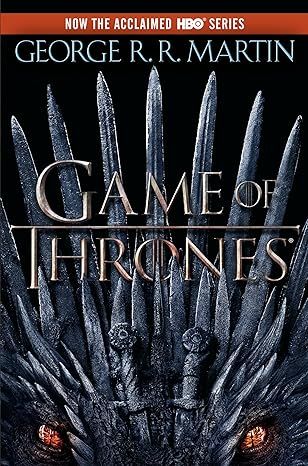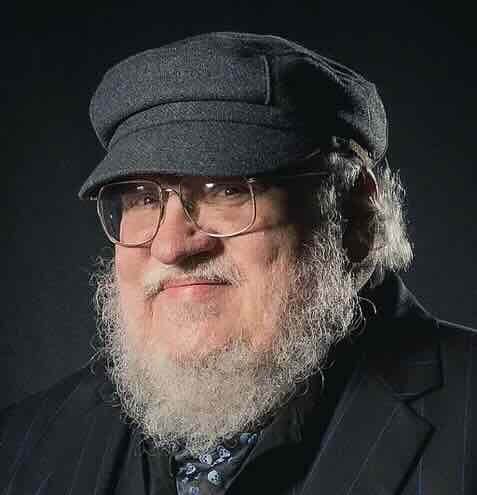A Game of Thrones (A Song of Ice and Fire, Book 1)
4.7
-
76,540 ratings
NOW THE ACCLAIMED HBO SERIES GAME OF THRONES—THE MASTERPIECE THAT BECAME A CULTURAL PHENOMENON
Here is the first book in the landmark series that has redefined imaginative fiction and become a modern masterpiece.
A GAME OF THRONES
In a land where summers can last decades and winters a lifetime, trouble is brewing. The cold is returning, and in the frozen wastes to the North of Winterfell, sinister and supernatural forces are massing beyond the kingdom’s protective Wall. At the center of the conflict lie the Starks of Winterfell, a family as harsh and unyielding as the land they were born to. Sweeping from a land of brutal cold to a distant summertime kingdom of epicurean plenty, here is a tale of lords and ladies, soldiers and sorcerers, assassins and bastards, who come together in a time of grim omens. Amid plots and counterplots, tragedy and betrayal, victory and terror, the fate of the Starks, their allies, and their enemies hangs perilously in the balance, as each endeavors to win that deadliest of conflicts: the game of thrones.
A GAME OF THRONES • A CLASH OF KINGS • A STORM OF SWORDS • A FEAST FOR CROWS • A DANCE WITH DRAGONS
Kindle
$8.99
Available instantly
Audiobook
$0.00
with membership trial
Hardcover
$27.32
Paperback
$11.62
Ships from
Amazon.com
Payment
Secure transaction
ISBN-10
0553386794
ISBN-13
978-0553386790
Print length
720 pages
Language
English
Publisher
Bantam
Publication date
March 21, 2011
Dimensions
6.06 x 1.23 x 9.1 inches
Item weight
1.52 pounds
Frequently bought together
Popular highlights in this book
We are only human, and the gods have fashioned us for love. That is our great glory, and our great tragedy.
Highlighted by 11,195 Kindle readers
Some old wounds never truly heal, and bleed again at the slightest word.
Highlighted by 10,936 Kindle readers
When you play the game of thrones, you win or you die. There is no middle ground.
Highlighted by 6,458 Kindle readers
Product details
ASIN :
B000QCS8TW
File size :
8479 KB
Text-to-speech :
Enabled
Screen reader :
Supported
Enhanced typesetting :
Enabled
X-Ray :
Enabled
Word wise :
Enabled
Editorial reviews
“I always expect the best from George R. R. Martin, and he always delivers.”—Robert Jordan
“Reminiscent of T. H. White’s The Once and Future King, this novel is an absorbing combination of the mythic, the sweepingly historical, and the intensely personal.”—Chicago Sun-Times
“A vast, rich saga, with splendid characters and an intricate plot flawlessly articulated against a backdrop of real depth and texture.”—Kirkus Reviews
“Martin makes a triumphant return to high fantasy . . . [with] superbly developed characters, accomplished prose, and sheer bloodymindedness.”—Publishers Weekly, starred review
“A splendid saga . . . . Inventive and intricately plotted.”—BookPage
“Such a splendid tale and such a fantasticorical! I read my eyes out and couldn't stop ‘til I finished and it was dawn.”—Anne McCaffrey
Sample
BRAN
The morning had dawned clear and cold, with a crispness that hinted at the end of summer. They set forth at daybreak to see a man beheaded, twenty in all, and Bran rode among them, nervous with excitement. This was the first time he had been deemed old enough to go with his lord father and his brothers to see the king’s justice done. It was the ninth year of summer, and the seventh of Bran’s life.
The man had been taken outside a small holdfast in the hills. Robb thought he was a wildling, his sword sworn to Mance Rayder, the King-beyond-the-Wall. It made Bran’s skin prickle to think of it. He remembered the hearth tales Old Nan told them. The wildlings were cruel men, she said, slavers and slayers and thieves. They consorted with giants and ghouls, stole girl children in the dead of night, and drank blood from polished horns. And their women lay with the Others in the Long Night to sire terrible half-human children.
But the man they found bound hand and foot to the holdfast wall awaiting the king’s justice was old and scrawny, not much taller than Robb. He had lost both ears and a finger to frostbite, and he dressed all in black, the same as a brother of the Night’s Watch, except that his furs were ragged and greasy.
The breath of man and horse mingled, steaming, in the cold morning air as his lord father had the man cut down from the wall and dragged before them. Robb and Jon sat tall and still on their horses, with Bran between them on his pony, trying to seem older than seven, trying to pretend that he’d seen all this before. A faint wind blew through the holdfast gate. Over their heads flapped the banner of the Starks of Winterfell: a grey direwolf racing across an ice-white field.
Bran’s father sat solemnly on his horse, long brown hair stirring in the wind. His closely trimmed beard was shot with white, making him look older than his thirty-five years. He had a grim cast to his grey eyes this day, and he seemed not at all the man who would sit before the fire in the evening and talk softly of the age of heroes and the children of the forest. He had taken off Father’s face, Bran thought, and donned the face of Lord Stark of Winterfell.
There were questions asked and answers given there in the chill of morning, but afterward Bran could not recall much of what had been said. Finally his lord father gave a command, and two of his guardsmen dragged the ragged man to the ironwood stump in the center of the square. They forced his head down onto the hard black wood. Lord Eddard Stark dismounted and his ward Theon Greyjoy brought forth the sword. “Ice,” that sword was called. It was as wide across as a man’s hand, and taller even than Robb. The blade was Valyrian steel, spell-forged and dark as smoke. Nothing held an edge like Valyrian steel. His father peeled off his gloves and handed them to Jory Cassel, the captain of his household guard. He took hold of Ice with both hands and said, “In the name of Robert of the House Baratheon, the First of his Name, King of the Andals and the Rhoynar and the First Men, Lord of the Seven Kingdoms and Protector of the Realm, by the word of Eddard of the House Stark, Lord of Winterfell and Warden of the North, I do sentence you to die.” He lifted the greatsword high above his head.
Bran’s bastard brother Jon Snow moved closer. “Keep the pony well in hand,” he whispered. “And don’t look away. Father will know if you do.”
Bran kept his pony well in hand, and did not look away.
His father took off the man’s head with a single sure stroke. Blood sprayed out across the snow, as red as summerwine. One of the horses reared and had to be restrained to keep from bolting. Bran could not take his eyes off the blood. The snows around the stump drank it eagerly, reddening as he watched.
The head bounced off a thick root and rolled. It came up near Greyjoy’s feet. Theon was a lean, dark youth of nineteen who found everything amusing. He laughed, put his boot on the head, and kicked it away.
“Ass,” Jon muttered, low enough so Greyjoy did not hear. He put a hand on Bran’s shoulder, and Bran looked over at his bastard brother. “You did well,” Jon told him solemnly. Jon was fourteen, an old hand at justice.
It seemed colder on the long ride back to Winterfell, though the wind had died by then and the sun was higher in the sky. Bran rode with his brothers, well ahead of the main party, his pony struggling hard to keep up with their horses.
“The deserter died bravely,” Robb said. He was big and broad and growing every day, with his mother’s coloring, the fair skin, red-brown hair, and blue eyes of the Tullys of Riverrun. “He had courage, at the least.”
“No,” Jon Snow said quietly. “It was not courage. This one was dead of fear. You could see it in his eyes, Stark.” Jon’s eyes were a grey so dark they seemed almost black, but there was little they did not see. He was of an age with Robb, but they did not look alike. Jon was slender where Robb was muscular, dark where Robb was fair, graceful and quick where his half brother was strong and fast.
Robb was not impressed. “The Others take his eyes,” he swore. “He died well. Race you to the bridge?”
“Done,” Jon said, kicking his horse forward. Robb cursed and followed, and they galloped off down the trail, Robb laughing and hooting, Jon silent and intent. The hooves of their horses kicked up showers of snow as they went.
Bran did not try to follow. His pony could not keep up. He had seen the ragged man’s eyes, and he was thinking of them now. After a while, the sound of Robb’s laughter receded, and the woods grew silent again.
So deep in thought was he that he never heard the rest of the party until his father moved up to ride beside him. “Are you well, Bran?” he asked, not unkindly.
“Yes, Father,” Bran told him. He looked up. Wrapped in his furs and leathers, mounted on his great warhorse, his lord father loomed over him like a giant.
“Robb says the man died bravely, but Jon says he was afraid.”
“What do you think?” his father asked.
Bran thought about it. “Can a man still be brave if he’s afraid?”
“That is the only time a man can be brave,” his father told him. “Do you understand why I did it?”
“He was a wildling,” Bran said. “They carry off women and sell them to the Others.”
His lord father smiled. “Old Nan has been telling you stories again. In truth, the man was an oathbreaker, a deserter from the Night’s Watch. No man is more dangerous. The deserter knows his life is forfeit if he is taken, so he will not flinch from any crime, no matter how vile. But you mistake me. The question was not why the man had to die, but why I must do it.”
Bran had no answer for that. “King Robert has a headsman,” he said, uncertainly.
“He does,” his father admitted. “As did the Targaryen kings before him. Yet our way is the older way. The blood of the First Men still flows in the veins of the Starks, and we hold to the belief that the man who passes the sentence should swing the sword. If you would take a man’s life, you owe it to him to look into his eyes and hear his final words. And if you cannot bear to do that, then perhaps the man does not deserve to die.
“One day, Bran, you will be Robb’s bannerman, holding a keep of your own for your brother and your king, and justice will fall to you. When that day comes, you must take no pleasure in the task, but neither must you look away. A ruler who hides behind paid executioners soon forgets what death is.”
That was when Jon reappeared on the crest of the hill before them. He waved and shouted down at them. “Father, Bran, come quickly, see what Robb has found!” Then he was gone again.
Jory rode up beside them. “Trouble, my lord?”
“Beyond a doubt,” his lord father said. “Come, let us see what mischief my sons have rooted out now.” He sent his horse into a trot. Jory and Bran and the rest came after.
They found Robb on the riverbank north of the bridge, with Jon still mounted beside him. The late summer snows had been heavy this moonturn. Robb stood knee-deep in white, his hood pulled back so the sun shone in his hair. He was cradling something in his arm, while the boys talked in hushed, excited voices.
The riders picked their way carefully through the drifts, groping for solid footing on the hidden, uneven ground. Jory Cassel and Theon Greyjoy were the first to reach the boys. Greyjoy was laughing and joking as he rode. Bran heard the breath go out of him. “Gods!” he exclaimed, struggling to keep control of his horse as he reached for his sword.
Jory’s sword was already out. “Robb, get away from it!” he called as his horse reared under him.
Robb grinned and looked up from the bundle in his arms. “She can’t hurt you,” he said. “She’s dead, Jory.”
Bran was afire with curiosity by then. He would have spurred the pony faster, but his father made them dismount beside the bridge and approach on foot. Bran jumped off and ran.
By then Jon, Jory, and Theon Greyjoy had all dismounted as well. “What in the seven hells is it?” Greyjoy was saying.
“A wolf,” Robb told him.
“A freak,” Greyjoy said. “Look at the size of it.”
Bran’s heart was thumping in his chest as he pushed through a waist-high drift to his brothers’ side.
Half-buried in bloodstained snow, a huge dark shape slumped in death. Ice had formed in its shaggy grey fur, and the faint smell of corruption clung to it like a woman’s perfume. Bran glimpsed blind eyes crawling with maggots, a wide mouth full of yellowed teeth. But it was the size of it that made him gasp. It was bigger than his pony, twice the size of the largest hound in his father’s kennel.
“It’s no freak,” Jon said calmly. “That’s a direwolf. They grow larger than the other kind.”
Theon Greyjoy said, “There’s not been a direwolf sighted south of the Wall in two hundred years.”
“I see one now,” Jon replied.
Read more
About the authors
George R. R. Martin
George R.R. Martin is the globally bestselling author of many fine novels, including A Game of Thrones, A Clash of Kings, A Storm of Swords, A Feast for Crows, and A Dance with Dragons, which together make up the series A Song of Ice and Fire, on which HBO based the world’s most-watched television series, Game of Thrones. Other works set in or about Westeros include The World of Ice and Fire, and A Knight of the Seven Kingdoms. His science fiction novella Nightflyers has also been adapted as a television series; and he is the creator of the shared-world Wild Cards universe, working with the finest writers in the genre. He lives in Santa Fe, New Mexico.
Read more
Reviews
Customer reviews
4.7 out of 5
76,540 global ratings
Sean
5
True Literary Fantasy
Reviewed in the United States on February 18, 2011
Verified Purchase
[There is a thorough review for ASOIAF here on amazon which outlines many significant points, but I thought I'd put out a review in my own words, simply because I care so much about this series.]
A Song of Ice and Fire, by George R. R. Martin consists of:
- A Game of Thrones (to be aired as the HBO series Game of Thrones on April 17, 2011)
- A Clash of Kings
- A Storm of Swords
- A Feast for Crows
- A Dance with Dragons (via Martin's "Not a Blog" LiveJournal, he has 3 POV chapters left to finish at the time of this writing.)
- The Winds of Winter (forthcoming)
- A Dream of Spring (forthcoming)
What's all the fuss?
This series is the progenitor of a new wave of literature which combines elements of epic fantasy, dark fantasy, and intellectual literary fiction. The idea was to create a true world (in all its color, grit, mystery, politics, realism and so on) through cultured prose, and yet still have all the elements of escapist fantasy; the idea was to create real people with real drama, and insert them into a fantastic reality; the idea was to reinvent the fantasy genre from cliché hack-and-slash/sword-and-sorcery to something original, passionate, and enthralling.
Martin succeeded in these goals, and inspired others to follow in a similar vein: The Malazan Book of the Fallen, The Kingkiller Chronicles, The Prince of Nothing, The Gentleman Bastard, The First Law, etc.
Why so good?
-
Exceptional writing: Martin is a literary master. His prose doesn't just "work," it really inspires. His vocabulary is learned yet approachable. The text inserts me directly into this medieval kingdom. Imagery runs rampant with details galore. Just a very well written story.
-
Believable characters: Grey characters! Real, believable characters with unique dialogue, motivations, and reactions populate this entire series. Martin develops interesting personalities with his talent for voice. These characters come alive within just a few pages of reading their chapters. People change! What a concept!
-
Risk: This is a world of blades and steel, arrows and leather. People die in war. This is a story of politics, intrigue, and betrayal. People are assassinated. Main characters may serve as a central window into the chief plotline, but that certainly doesn't mean that they are safe from harm. Pain and death MEAN something, and Martin loves to make us feel.
-
History: Martin has spent years living in this world, and the history is so rich that the immersion is instant. It's almost disorienting. The details that he has planned out and the meticulousness of the layers within the story are so natural that you cannot help but be in awe.
-
Tactful use of fantasy elements: No "magic missile" spells or "jelly-legs" jinxes here. There are strong fantasy elements, but they are used in tactful, and oftentimes subtle, ways. The supernatural is seen as superstition by most of the characters in the story, and so when something akin to "magic" does show up, it is unique and potent.
-
Details matter: Watch the description of a character, even if you don't know the character's name; they'll show up later. Actually think about what people say; you may be able to find out the answer to a question far before the characters do. Dreams and prophecies may be vague, but they are actually vital! Martin has also acknowledged his use of the unreliable narrator (in fact, he has to use it, in order to make the POV chapters believable); find the inconsistencies between what happens and what characters think, and see the story from a different perspective!
-
Engaging plot: All three main plotlines are exotic and entertaining: the fight for power over Westeros' throne, the exile of the last Targaryen queen, and the threat of the Others in the north. Filled with cliffhangers chapter after chapter, mysteries that need solving, epic moments of badassery, horrible moments of dread, cool one-liners and philosophical quotes, raunchy sex, and violent death, the story is brimming with awesome.
Why doesn't everyone like this series, then?
Virtually every one- or two-star review I have seen (amazon, goodreads, etc.) can be boiled down to one of three categories:
-
"The Fantasy Lover" (a.k.a. "Sex is Nasty" Syndrome) a. "Ew, it's so gross and disgusting and tragic and there's so much sex and violence and swearing! Where is my damsel being rescued by the handsome, heroic prince? Why do people die? I felt like
washing in industrial cleanser' to get this filth away from me! Fantasy should only be about romantic ideals and have nothing to do with reality... and the good guys should always win!" b. To you, I say, stop being such a prude. The writing is excellent and appropriate to its content, and the idea is to explore the connection between fantasy and reality. Fantasy does not have an "end purpose" in mind, and you are simply being obstinate about originality and progress. People are not black and white and neither is life; people die, and people are maimed, and people have sex, and people go to the bathroom, and people are raped, and sometimes, thebad guys' win; however, I think escapist fantasy may be even MORE engaging when combined with those aspects of reality... and that is an opinion enjoyed by millions of people. -
"The Whiner" (a.k.a. "The Author is My Bitch" Syndrome) a. "It's been five years since the last book, and Martin is fat and old, and he has his fingers in so many pies, and he doesn't care about the series anymore, and he's just trying to milk it, and why can't he finish it already, and I could have the next book written by now, and and and and and...." b. To you, I say, no, the author is not your slave. Your buying his books did not indenture him into servitude, nor did it oblige a contract. He writes when he writes, and you read when he's done. Complaining about it [timing, his other projects, etc.] makes you look pathetic, silly, and a tad bit unstable. It's like trying to intimidate a world-renowned TV chef to finish his/her magnum opus because you just want lunch on your TV tray, damnit! How full of yourself do you have to be? c. Also, the books do not deserve a one star rating simply because they aren't coming out as fast as you want.
-
"The Pragmatist" (a.k.a. "But Reading Takes So Much Time!" Syndrome) a. "The first book is 800 pages, and they just get longer from there; there's no end in sight for the series and no single book tells a full story; there's too much exposition with too much `backstory'; the plot is so slow!" b. To you, I say... well, this might actually be a valid concern for some people. The story IS huge... but in case you didn't see the genre description, it is EPIC fantasy, and Martin has himself described it as having a "cast of thousands." The advantages of longer books are that characters can develop into fully fleshed out beings and that a fictional world can become, in some part, real. It's also a huge story in terms of scope - the synopsis states it simply enough: "...where summers can last decades and winters a lifetime...."
Minor Spoilers on Individual Books:
A Game of Thrones A brilliant first book, this begins each of the three main plots. For the first plot, the main house we deal with here is the Starks, the house "in charge" of the North. For the second plot, we are introduced to the naiveté of Daenerys (Duh-NAIR-iss) and for the third, we get to see the shabby condition of the Night's Watch. Though each plot develops independently, it is easy to see how they interconnect. The characters really drive this piece, and it is a true trip for anyone, new or old, to the genre. A 5 star book if there ever was one.
Obliviously, I not only recommend this specific book, but the entire series. All the best, and happy reading!
Read more
17 people found this helpful
Hannibal0020
5
Let the Games Begin
Reviewed in the United States on June 26, 2012
Verified Purchase
If you're going to consider reading `The Song of Ice and Fire' series, then be prepared for an investment. These books aren't for casual readers, but rather slower and more methodical ones. Requiring a great deal of your time, attention to detail, and the memorization of various characters' political and social associations. The amount of content the book contains is equal to the level of commitment you are willing to give. This may sound intimidating to some people, but Games of Thrones is able to deliver a very deep story targeting a mature audience because of this, though this also means the book's level of comprehension and adult content may become a deal-breaker to some people. Persevere and you'll enjoy one of the best fantasy epics in quite some time.
As I previously said, the narrative of A Game of Thrones can be quite cumbersome to comprehend at the very beginning, and the faint synopsis doesn't exactly paint a very big picture of what's to come. So I've decided to provide a brief synopsis of my own.
With the murder of King Robert Baratheon's Hand Jon Aryn', his Majesty himself has requested that his old friend Eddard Stark, head of House Stark take up the role at his side in King's Landing to help him properly govern the realm. Of course taking up this honorable task would mean Eddard, Ned' must leave the sanctity of Winterfell and his family. But he soon realizes that treachery and deception have consumed the nobility, no one can be trusted, everyone is trying to seize power by any means necessary; particularly the cunning Lannister family. The book doesn't just follow the character Ned, but rather a large collection of personas, some intertwine with the central story arc involving Ned, others involve their own. Daenerys Targaryen, one of the last of the feared House Targaryen, is forced into a marriage with a savage Dothraki warlord in order to gain in army for the means of reconquering her rightful throne. The last major story arc involves Ned's bastard son Jon Snow' and his indoctrination in the enigmatic Night's Watch', where desertion is punishable by death.
While the plot of A Game of Thrones is truly an epic piece of fiction-writing, it would be nothing if the characters weren't believable. George R. R. Martin has established himself as a very strong character-driven author, one who focuses on the problems of these people and how they affect them. While there are characters which are not affiliated with Eddard Stark, the majority of the major characters can be allocated into the two major noble families: the Starks and the Lannisters. The Starks characterize honor, duty, diligence, and integrity, making them the primary protagonists. They're opposed by the ambitiously materialistic Lannister family, who seem like Martin's equivalent of the Borgia's. Though if there's a weakness in the characterization department, it would be that not enough is done with characterizing the Lannister family. The Stark family makes up the bulk of the story's protagonists, but they aren't exactly perfect. They can be rude, selfish, jealous, and even bratty at times, they're delightfully flawed characters. With the exception of the great character `Tyrion Lannister', we're given very little insight into the life of the family aside from their obvious immoral tendencies. The Lannisters, while morally vague, come off feeling much less defined. I really wish more could have been done with them when compared to the excellently characterized Stark family.
In a seemingly endless miasma of betrayal and deceit, the only beacon of hope comes in the form of family. The Starks, particularly the Stark children felt like the real heart of the book for me. Their precious innocence helps invest the reader in the story even further, especially since they're among the victims in this malicious game that the adults are playing. It only reinforces the insurmountable stakes and that nobody is truly safe or completely innocent.
Even the world itself feels like a character that helps ground the reader in the author's fiction. Martin's Seven Kingdoms' are vividly brought to life with intricate detail that makes it really pop off the pages. Its geography, political structure, and the dominant noble houses are all elaborated upon in surreal detail that really gives the reader a feeling of place. Less reliance on more fantastical elements like elves and dwarves gives Martin's world a pinch of reality that most authors tend to avoid. With the exception of the White Walkers' and the extinct dragons, all mystical aspects are kept at an all-time low, favoring words and steel over mysticism and spells. The outcome is a fantasy world that surprisingly, comes off as genuinely plausible. The Seven Kingdoms feels like a realm that very much could have existed. It's an interesting divergence from the typical high fantasy settings.
There's going to be the inevitable comparison between Martin's work and the legacy left behind by Tolkien as the great forefather of fantasy writing. The notion of comparing the two is entirely misguided, simply because Martin's writing is completely different from Tolkien's in nearly every angle. Tolkien emphasized the ongoing struggle between good and evil, the thrill of high adventure in a fantastical world, and the triumph of great heroes over terrible villains who would do the world harm. Martin on the other hand is much less black and white with his delivery. There are obvious characters you can label as `dishonorable', while others stand atop a pedestal as paragons of altruism. But are these characters truly evil for trying to secure the benefit of their family and future generations to come? And are these characters considered good if they're ensuring the stability of the realm by dishonest methods? Martin chose to forgo typical fantasy conventions of magic and obvious morality in the favor of characters who feel genuinely believable in all the most despicable ways. They're not the great heroes Tolkien illustrated; they're morally ambiguous human beings. That's the defining characteristic which separates these two giants of fantasy, the selfless heroes and the morally grey humans. Comparing these two juggernauts is completely irrelevant, for Martin isn't trying to replicate Tolkien but rather make his own beast.
Yet, I never like to jump on a bandwagon and proclaim with the rest of the world that a novel is absolutely perfect. Of course these critiques are personal ones and admittedly border on flat-out nitpicking. The first is the absolutely insane overabundance of minor characters. I'm not referring to the central characters that the various chapters shift between; they're all perfectly characterized and fascinating. I'm referring to the endless onslaught of characters that overcrowd the book, but serve little importance in the greater scheme of things. Every story arc is jam-packed with so many characters that range from semi-important to useless. I usually wouldn't mention this, but with a book of this magnitude it really became an issue with me, though it may not for other people. The second issue is the lack of a proper climax to the story. I'm all for having an intriguing plot over a mindless slog of action scenes, but with a book of this size, it would have been nice to have it end with a bang. It's little things like these that stand out when the rest of the book is just so good.
When Hollywood absolutely bastardized the final Harry Potter novel by splitting it into two movies in order to fill their glutinous craving for money; I became somewhat of a skeptic to segmenting visual adaptations of popular literature. Creating a television show made me raise an eyebrow, "instead of making a movie they're going to milk it with a whole season of episodes" I thought. After reading A Game of Thrones, I realized that making a television show out of the book isn't just a good idea, it's absolutely mandatory. This book and its sequels have so much content in them that a movie would never do the plot and its various characters justice. It's the perfect source material for an epic fantasy television series, which is great considering we don't exactly have many of those.
A Game of Thrones is the start of something special. The beginning chapter of an epic tale that needs to be read by everyone of age who can truly appreciate its complexity. Read the book first before you watch the show, only then can you truly appreciate George R. R. Martin's natural talent for weaving such incredible stories.
Read more
25 people found this helpful
Nikita
5
Compelling and Riveting!
Reviewed in the United States on January 11, 2014
Verified Purchase
I am writing this review as an individual who watched Game of Thrones on HBO before picking up the book series, so with that in mind you may or may not find my review helpful/useful. I will also try to keep this review as spoiler-free as possible.
As a fan of the tv series, I came into this book knowing what to expect; I was told that Season 1 and Book 1 are very similar, and that is most certainly true. But do you know what? I still loved the book. I’ll do list format for the book’s good and bad points (in my opinion and in no particular order) to make this a little more organized.
-- GOODS:
DIALOGUE/WRITING - George RR Martin has a way with words. His descriptions of the various locations and lands and kingdoms of Westeros, from Winterfell to King’s Landing to Vaes Dothrak, have flawless flow. I love descriptive writing, and there is always a fine line between not describing something enough to give the reader a good picture and going overboard to the point where it gets boring to read through paragraphs of superfluous text. This is especially true in the fantasy genre, where the lands and people and words and customs are all…well, fantastical. This book finds that balance, with evocative, beautiful language that puts you right in that setting and right in the thick of the action. Hell, the descriptions of food always made me hungry even if they were serving something that I would never actually eat! As for the dialogue, if you are a fan of the show’s dialogue, or clever dialogue in general, you will enjoy this book. There are a good number of memorable and poignant quotes throughout the book, my favorite being “When you play the game of thrones, you win or you die,” an apt summary for sure. Bottom line, when you pick up this book, be prepared to engross yourself and be swept away to a foreign land.
VOICES/POINTS OF VIEW - Notable about this book, and all the books in the series, is that it is constantly switching from various characters points of view (POVs, as I’ll refer to them from now on). And by various, I mean roughly 7-8 characters. As difficult as this is to pull off, Martin does a great job. It’s an effective way to see what is going on in multiple locations at roughly the same time while keeping us invested. I applaud his decision to present us the information this way as it gives us a greater connection with the characters and more insight into various situations as we see how they are impacting the character that we are viewing it through. Not to mention, Martin manages to keep each of the individual POVs unique enough that you don’t need to flip back to see who’s narrating. Each character has distinct personality traits and ways of thinking/speaking that distinguish them from the others. Sansa is lady-like, a romantic and naive. Arya is fiery, resourceful and a fighter. Tyrion is shrewd, astute and full of quick-witted jibes. And so on and so forth. It is also worth noting that each character, even if a few of them are in the same place at the same time, sees different things and different people and analyzes situations in different ways, so each chapter gives you new information in some way or another. It’s very cleverly done and just as frustrating when you realize “UGH this character doesn’t know what was revealed to me, the reader, in THIS CHARACTER’S chapter” which is a great way of keeping you hooked.
CHARACTERS: HEROES VS VILLAINS - Getting inside the characters heads, you start to understand their motives and the ways that they think. So you get to decide for yourself what motives are justified and who you believe in or who you’re rooting for. But then again, just because one character appears to be the “hero” of the story, doesn’t mean they’ll necessarily get a happy ending. If you’re looking for a feel-good story about about good conquering evil, this probably isn’t for you. If you’re looking for a story with deep, cunning characters who you can’t always trust, who are shades of grey versus black and white, then you’ll find this book a compelling read.
DEPTH - Martin has done his homework and has developed rich histories for each of the characters and their houses. Hell, the Appendix of the book has small blurbs about each house, its history, its sigil, its words/slogan and the relevant members of the house. It’s always available for you to flip back and read if you find yourself confused, which can happen. Having watched the tv series, I was less confused about the various Houses and characters coming into the book, which helped a lot. Yet I still found myself learning new information from the Appendix. It’s a great tool and shows the author’s dedication to his characters and their backgrounds. I was impressed by how richly developed everything was, even though this is only the first book in the series.
NO TEENAGE DIARY DESCRIPTIONS ABOUT SEX - This book has sex in it. Quite a bit, too. I can see how this would be off-putting to some readers. Personally, I don’t mind it much. What I appreciated was that the descriptions of sex weren’t long, drawn out, excessively pornographic or mushy-gushy. I appreciated not having to wade through pages upon pages of “his fingers brushed against my fingers and my heart fluttered, he looked at me and I admired his beautiful eyelashes” or other mushy teenage romance dialogues that frankly bore the poop out of me. On the other hand, you’re not reading through pages and pages of detailed erotica either. It’s written very matter-of-factly, very bluntly and to-the-point and only went into a bit more description when it was warranted. Again, I imagine this isn’t for everyone, so you may consider this a negative. The way it was presented throughout the book, however, I felt warranted a checkmark in the “Good” category.
FEMALE CHARACTERS - Some of the best depictions of female characters I have read. I was very impressed. The female characters are at all ends of the spectrum in this book, from feminine to tough to conniving. In a book where you’d assume the male characters take front and center, the female characters are just as fascinating, if not moreso in some cases.
X-RAY - I have the Kindle version of this book. The X-Ray features really helps you keep track of the book’s many characters and remind you who someone is if you forget, which is SUPER helpful. I used the features many times throughout the book and it definitely aided my understanding and allowed me to further appreciate the depth of the characters and the story.
-- BADS:
MULTIPLE POVs SLOW DOWN THE ACTION - The constant cutting back and forth between different characters and settings, while well done, also has the side effect of slowing down some of the action. You end a chapter on a cliffhanger as the one character’s POV learns something horrifying or experiences something shocking. But then the next chapter jumps to a character who is in a completely different setting and you have to wait until you get to a chapter of a character who is in place where the cliffhanger first happened. It slows down the action a bit, which can get a little frustrating. If it really bothers you to read a cliffhanger and then wait a few chapters to see a reaction or resolution to that cliffhanger, then this book might frustrate you more than entertain you. Not to mention, if you find one character’s voice/writing style/actions particularly boring, you might find it tiresome to have to wade through those chapters to get to the “good stuff.” I know I personally had that problem in a few instances.
TYPOS - I have the Kindle version of this book, and it had quite a number of typos. Not on every page or anything, but more than I would have liked. A few of them sort of interrupted the flow of the story while I was reading, but for the most part they aren’t a huge deal. Just a little annoying.
LENGTH - Not gonna lie, flipping through the Table of Contents and realizing there are 72 chapters was a little daunting. And if you have a really busy schedule, you might find the length a little scary too. I’m very glad I stuck it out and plowed through, though!
-- Overall, I’m a happy camper and am going to pick up the second book in the series ASAP!
Read more
32 people found this helpful
Top George R. R. Martin titles
View all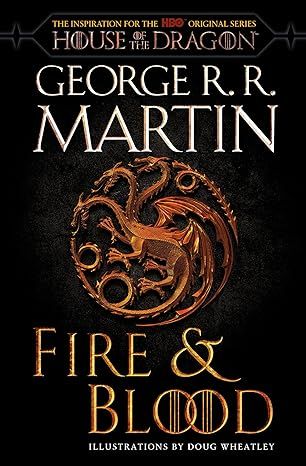
Fire & Blood (HBO Tie-in Edition): 300 Years Before A Game of Thrones (The Targaryen Dynasty: The House of the Dragon)
4.5
-
33,502
$7.99
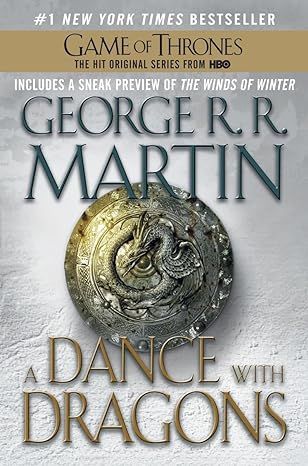
A Dance with Dragons: A Song of Ice and Fire: Book Five
4.6
-
48,583
$7.65
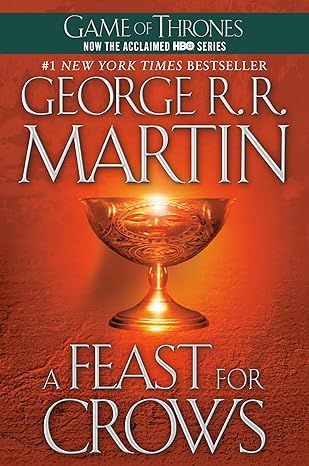
A Feast for Crows (A Song of Ice and Fire, Book 4)
4.5
-
33,750
$4.06
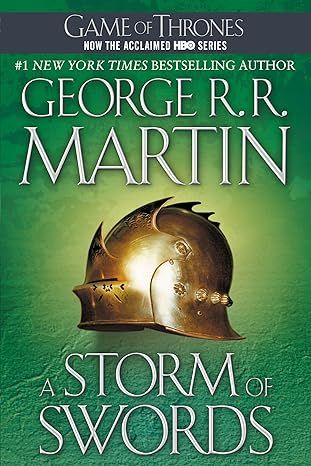
A Storm of Swords: A Song of Ice and Fire: Book Three
4.7
-
32,772
$2.10
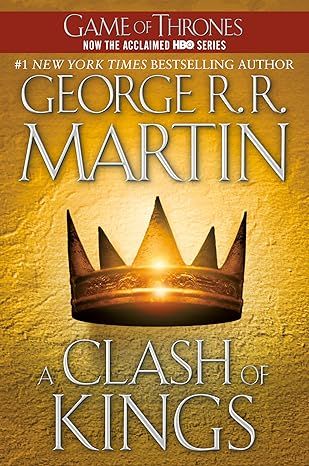
A Clash of Kings (A Song of Ice and Fire, Book 2)
4.7
-
42,210
$2.43
Similar Books
Best sellers
View all
The Tuscan Child
4.2
-
100,022
$8.39

The Thursday Murder Club: A Novel (A Thursday Murder Club Mystery)
4.3
-
155,575
$6.33

Sapiens: A Brief History of Humankind
4.6
-
140,302
$13.49

The Butterfly Garden (The Collector, 1)
4.3
-
88,556
$9.59

Things We Hide from the Light (Knockemout Series, 2)
4.4
-
94,890
$11.66

The Last Thing He Told Me: A Novel
4.3
-
154,085
$2.99

The Perfect Marriage: A Completely Gripping Psychological Suspense
4.3
-
143,196
$9.47

The Coworker
4.1
-
80,003
$13.48

First Lie Wins: A Novel (Random House Large Print)
4.3
-
54,062
$14.99

Mile High (Windy City Series Book 1)
4.4
-
59,745
$16.19

Layla
4.2
-
107,613
$8.99

The Locked Door
4.4
-
94,673
$8.53
